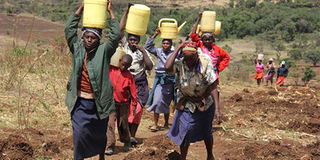Where is the water for grassroots women to wash their hands?

Women and children trek uphill after fetching water from a dying stream in Ainabkoi, Uasin Gishu County, on February 14, 2017. PHOTO | FILE | NATION MEDIA GROUP
What you need to know:
Traditionally bear the burden of sourcing for water and taking care of the sick and the family in general.
If women are unable to access clean and quality water, the situation will becomes dire for them, families and the society in general.
- It is pertinent that radical and extra ordinary measures are in place to ensure that women in the grassroots in all the 47 counties have constant access to water.
What a timing for the 2020 World Water Day in the wake of Covid-19!
The world, including the most economically developed nations, have not been spared by the deadly coronavirus.
In order to contain and combat spreading of the humbling and threatening Covid-19, the Kenya government has put in place strict and specific for the public and everyone for that matter, that they must observe at all times.
As the international community celebrates the annual World Water Day on March 22, 2020, it is important that we pause to observe certain realities.
How many times, for instance, have we heard the phrase wash your hand with water and soap? We have constantly been told that proper of washing hands with soap and water is the most effective and cheapest form of controlling infections.
But even as we fight the spread of Covid-19, there is need for the government and ourselves to ask; where is this water? How cheap is this water? How many Kenyans and especially women living at the grassroots have access to water, and quality water at that?
The WASH (Water, Sanitation and Hygiene) joint monitoring programme report (2019) by The World Health Organisation and Unicef, found that only 59 percent of Kenyans have access to basic water services.
What hope do the remaining 41 percent have in light of the Covid-19 virus? This is a critical issue that we as a nation has address as a matter of priority and urgency, especially at this time when we are trying to fight spread of the Coronavirus pandemic from causing further economic and social devastation and to ensure the welfare of the people and specifically women at the country’s grassroots.
In some areas of Kenya, women at the grassroots have to walk up to a minimum of more than two kilometers to fetch water. In the capital Nairobi, taps are most times dry and the City thirsty, with most of the residents who live in highly populated estates and informal settlements otherwise known as slums, do not have constant supply of clean water.
The consequence of this at this time specifically, is that it exposes the residents to a high risk of being infected with Covid-19. This also applies to most rural areas of Kenya which experience lack of effective and constant supply of safe and clean water.
The Covid-19 pandemic has further compounded the care burden of women. This is because, women traditionally bear the burden of sourcing for water and taking care of the sick and the family in general. If women are unable to access clean and quality water, the situation will becomes dire for them, families and the society in general.
Water and Sanitation services is provided for in Chapter 4 (Bill of Rights), of the Constitution of Kenya 2010 Section 43 (1d) of the Constitution of Kenya states that “every person has the right to clean and safe water in adequate quantities”.
The Kenya vision 2030 strives to ensure the availability and access to water and improved sanitation for all. However, this vision has been curtailed by among others, corruption cartels that are aided by the same political class that is charged with the responsibility to deliver Vision 2030.
We have clear examples in the scandals pertaining to Arror and Kimwarer Dams and The Galana Kulalu irrigation project.
Even as the uncertainty of the Coronavirus pandemic continues to occupy the minds of every Kenyan, on this World Water Day, it is pertinent that both the national and county governments put in place radical and extra ordinary measures to ensure that women in the grassroots in all the 47 counties have constant access to water to- at the very least- be able to wash their hands (with soap) within the households!
GROOTS Kenya which works with women in the grassroots-the rural areas and in informal settlements- believes and from experience, that placing women in positions of leadership at all levels in the water sector is crucial in ensuring increased access to water by the women in Kenya and particularly those living in the rural areas and the slums.
It is in this light the organization has collected and is collating data on women’s access to water and evidence generation. The two levels of governments in our nation must also do the same as they seek to provide water, the all-important and golden liquid which together with soap-will help in fighting the pandemic that has invaded the world and threatening our nation and ensure women in grassroots areas of Kenya access quality water.
Ms Githuku is the Executive Director, GROOTS Kenya; [email protected], [email protected]; Twitter: @Fridahgithuku





